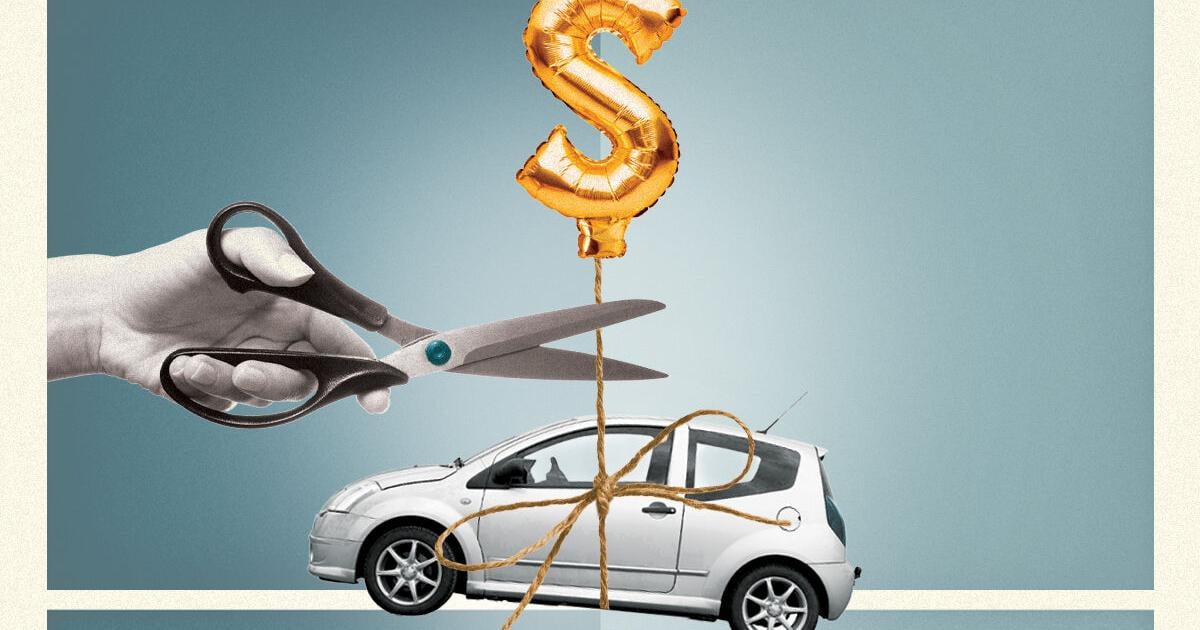For nearly 30 years, Tim Millan got around Toronto by car. He loved the convenience of owning a vehicle, but his “soul-sucking” commute was the final straw — 18 months ago he gave up his beloved Toyota 4Runner to go car-free. Now, the 54-year-old teacher estimates he’s saving around $500 a month by not owning a vehicle — and he has zero regrets.
Owning a car is a huge expense for Canadian households. According to a 2025 report from Ratehub, the average cost of owning a car is $1,370 per month (including car payments, gas, parking, insurance and maintenance). A recent report from car-sharing marketplace Turo found that car ownership costs have risen nine per cent since last year, and experts predict that number will continue to grow. The Turo report also found that 42 per cent of Canadians have had to cut back on spending in other areas to keep up with the costs of owning their vehicle.
When considering whether to join the car-free movement, it’s not just a simple money decision, says Credit Canada CEO Bruce Sellery — it’s also a mindset decision.
Consider your circumstances
The first thing to consider is your values, Sellery says. “Some people love cars and they love to drive. Other people simply do not care,” he says.
The next thing to consider is your circumstances. “I have to have a car because my kid has activities and not having a car would be too much for me, personally, as a parent,” he says.
Millan acknowledges that going car-free is easier for him now that his kids are in their 20s. “Our kids were in sports and different activities all over the city,” he says. “It would have been very challenging to try to get around (without a car).”
Another consideration is your daily commute. “It’s all well and good to say you’re going to go car-free when your commute is 15 minutes by bike,” Sellery says. A two-hour commute that involves numerous transit changes is very different.
For Millan, being able to go car-free meant finding a job closer to home. “I was working in a part of the city that was very difficult to get to by transit, and it was just a little bit too far to cycle or walk,” he says. He now walks to work, which takes around 20 minutes each way — and costs nothing.
Next consider how having a car impacts your mental well-being. “Some people feel better having a car,” Sellery says. “It gives them a feeling of freedom, and that’s not nothing — that counts.” Other people feel stressed about owning a car and the associated costs.
Finally, Sellery says, you should be honest about your needs versus your wants. “You really need transportation, for sure, but do you really need a car?” he says.
Matt Hands, Ratehub’s vice-president of insurance, says going car-free works best for people with remote or flexible work arrangements who don’t have to deal with regular suburban commutes, and households without frequent family obligations that require car travel outside the city.
Blair Kenneth Adamache, a 61-year-old investor and Toronto resident, gave up his car less than a month ago. For years, he commuted to Markham from Pickering by car. In the early ‘90s, he started biking to work three to four times a week. He and his wife had young kids and only one car, so she would use it on the days he cycled.
For the past 15 years, Adamache drove a used German sports car — and it got expensive. He was spending $100 a month on parking where he now lives, near Yonge and Eglinton, plus gas, insurance and maintenance. “When you own a 20-year-old sports car, you’re always asking what’s going to break next,” he says.
At the beginning of September, Adamache decided to ditch his car and go car-free for six months to see how it goes.
Do a cost-benefit analysis
On the math side, it’s important to do a cost-benefit calculation, Sellery says. Gather facts around your car expenses, including the car payment, insurance, maintenance, parking and gas. Ratehub’s report found that Canadians spend an average of $203 per month on gas, $200 on parking, $143 on car insurance and $79 on vehicle maintenance, while around $202 per month goes toward interest on car payments.
Most financial experts recommend keeping transportation costs between 15 and 20 per cent of your take-home pay, says Hands.
Next, take some time to think about how you use the car and how often you use it. “Maybe you work from home, but your parents live north of the city and you want to go see them once a month and it’s sure helpful to have a car,” Sellery says.
People’s needs, time, convenience and finances all play into how people get around, says Teresa Di Felice, assistant vice-president of government and community relations for CAA South Central Ontario. “If you’re driving your child to hockey and you’ve got all the equipment, it can be a little difficult to do that on something like transit,” she says. Think about how your needs can be best served on a regular basis, and explore how you can save money by still owning a car while using alternatives for some of your trips.
It’s also important to consider whether you own a paid-off vehicle and are avoiding new-car depreciation. “If you can offset costs through ride-sharing or delivery work, or if moving and selling costs outweigh short-term savings, keeping your car is smarter,” Hands says. Ultimately, he adds, the decision hinges on whether your transportation needs justify the $1,370 average monthly ownership cost versus transit and ride-sharing options.
Once you’ve looked at your expenses and use, you can consider the alternative options, including cycling, ride sharing, car sharing, car rental and the TTC. Sellery says to get creative with your thinking: Could you share a car with a sibling or a best friend? Can you carpool?
The TTC charges $156 for an adult monthly pass. Bike Share Toronto charges $105 plus HST for an annual pass that includes unlimited 30-minute rides. Then there are car-sharing services like Communauto, which offers free monthly membership plans and charges from $13 per hour for a car rental.
If you’re thinking about going car-free, it’s a good idea to tally up exactly how much you spent on owing a car in the past year (including maintenance and repair costs) to see how much you could potentially save and reinvest elsewhere to pay off debts, contribute to an RRSP or reach other financial goals.
Consider different transportation options
Millan has rented a car twice; once for a work retreat in Orillia and another time for a trip to Quebec. He occasionally takes the streetcar if it’s raining or snowing and uses his Presto pass to pay by trip. Otherwise, he walks or cycles to his destinations. He has an annual Bike Share Toronto membership and uses it to visit friends in the west end. He also uses it sometimes when he’s running late. “I can grab a bike and just shave 10 minutes off of my walk,” he says.
Maintenance and fuel are probably the biggest costs associated with owning a car, Di Felice says, adding that keeping your car in good shape helps keep costs low. Remove sports equipment, shoes and other items from the trunk and back seat when you don’t need them to reduce drag on your car, which will help you burn less gas. You should also remove bike racks or cargo racks from your vehicle’s roof when you’re not going to need them. Ensuring your tires are properly inflated can help increase fuel efficiency, too.
Hands says it’s worth shopping around annually for car insurance, as rates vary widely between providers. You can also lower premiums by increasing your deductibles, choosing vehicles with high safety ratings and low theft risk, and bundling your auto policy with home or tenant insurance for added discounts.
You can also save on gas through some credit card and loyalty rewards programs, Di Felice says. “Sometimes people don’t even know all the loyalty programs that they’re carrying around in their wallet, whether it’s CAA or other cards,” she says, adding that CAA members can save three cents per litre on gas at Shell.
Since giving up his car, Adamache racks up 5,000 to 10,000 steps a day just running errands. He mostly rides his bike to get around and uses the TTC during bad weather. He’s used Uber once so far, adding, “I’ve got $200 a month I could use on Uber and not feel guilty.”
He has family members who live in Pickering, and says public transit to Durham is a nightmare, so he’ll see how things work out over the next six months. He also recently did a Canadian Tire trip using the TTC to buy drapes and charcoal and some other “crazy heavy stuff” and thought, “That’s kind of over the edge of what I can do.” He says he could always rent a car, and that his best friend owns a pickup truck.
If Adamache does decide to buy a car again, he says, it would be a Toyota Corolla this time instead of a sports car.
For now, he says, being without a car feels like a big relief — and it’s helped him get ahead in other areas. “I said to myself, ‘I got rid of that car. I should do my taxes now!’ ”



